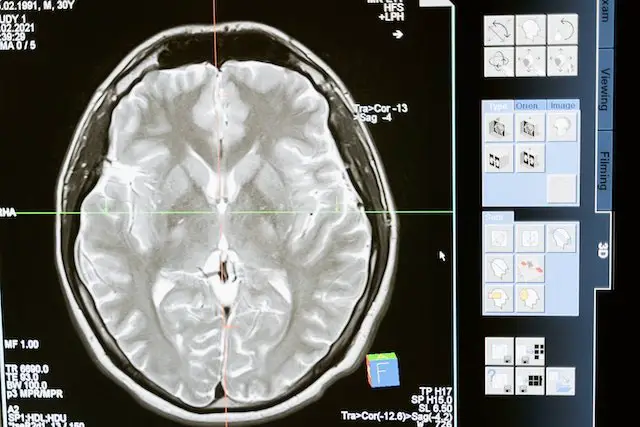Recently, scientists harnessed the power of artificial intelligence (AI) to detect a specific brain signal associated with the improvement of depressive symptoms in individuals undergoing deep-brain stimulation (DBS). DBS is a method involving the placement of electrodes within the brain to administer electric pulses, which modify neural functions.
Depression is a pervasive mental health condition that affects millions of individuals worldwide. While numerous treatment options exist, finding the right approach for each patient can be a challenging endeavor.
In a groundbreaking study conducted by researchers from the Georgia Institute of Technology, the Emory University School of Medicine, and the Icahn School of Medicine at Mount Sinai, the fusion of cutting-edge technology and medical innovation offers new hope for individuals grappling with treatment-resistant depression.
This study explores the use of Deep Brain Stimulation (DBS) therapy, coupled with Artificial Intelligence (AI) analysis, to potentially revolutionize the way we measure and manage depression. In this article, we delve into the significant implications of this research and its potential to transform the landscape of depression treatment.
The Challenge of Measuring Depression
Traditional approaches to measuring depression rely heavily on patients' self-reported mood assessments, which can be influenced by a myriad of external factors, including daily stressors.
This subjectivity has long posed a challenge for clinicians seeking to tailor effective treatments. However, the recent study presents an innovative solution that may allow us to measure changes in depression levels with a precision akin to monitoring blood pressure or heart rate.
→ Transforming Medicine: Harnessing the Potential of AI-Powered Intelligent Healthcare Facilities
Deep Brain Stimulation: A Potential Breakthrough

Deep Brain Stimulation (DBS) therapy has shown promise as a treatment for depression. However, its efficacy has varied among individuals, primarily due to the necessity of stimulating precise brain regions.
Successful DBS depends on accurate feedback regarding its impact on brain activity patterns. To address this challenge, the research team embarked on an ambitious journey to combine the power of DBS with the capabilities of Artificial Intelligence.
Unveiling the AI-Enhanced Approach
The integration of AI into DBS therapy marks a significant advancement. By employing a combination of electrode implants and AI analysis, the research team aimed to pinpoint changes in brain activity patterns induced by DBS.
This innovative approach not only eliminates the reliance on subjective mood reporting but also offers an objective, neurological signal as a biomarker linked to depression recovery.
The Remarkable Results
The outcome of this pioneering study is nothing short of remarkable. The researchers successfully identified a recovery signal associated with depression improvement. Impressively, this signal demonstrated an accuracy rate exceeding 90%.
Dr. Helen Mayberg, a neurologist at the Icahn School of Medicine at Mount Sinai, noted, "Nine out of 10 patients in the study got better, providing a perfect opportunity to use a novel technology to track the trajectory of their recovery."
This newfound accuracy in monitoring depression recovery offers a glimpse into a future where tailored treatments can be administered with unprecedented precision.
→ The Revolution of Artificial Intelligence in Healthcare and Medicine
The Role of Artificial Intelligence
Central to the success of this groundbreaking research was the utilization of Artificial Intelligence. The AI system was trained using brain images captured at the commencement and conclusion of the treatment process.
This allowed the AI to detect subtle neurological differences that might elude the human eye. For instance, one patient exhibited a positive response to treatment for four months before experiencing a relapse.
Remarkably, the AI detected the disappearance of the recovery signal a month before the relapse occurred. This capability holds immense potential for predicting and preventing relapses, a critical aspect of managing depression effectively.
→ Transforming the Future of Surgery: How Robotics and AI are Shaping Surgical Techniques
A Promising Future
While the integration of AI and DBS therapy presents a promising avenue for depression treatment, there is still much work to be done. The idea of having electrodes implanted in one's brain may not be well-received by all patients, and the procedure is not without its risks and limitations. However, the implications of this research are profound.
Advancing Depression Monitoring
The ability to objectively measure depression levels using AI-enhanced DBS could usher in a new era of mental health care. Gone would be the days of relying solely on subjective self-reports. Instead, clinicians would have access to concrete neurological data, enabling them to make more informed decisions about treatment adjustments.
Tailoring Treatment for Individuals
One of the most exciting prospects of this research is the potential for personalized depression treatments. With AI providing real-time feedback on a patient's condition, adjustments to DBS therapy can be made promptly, potentially preventing relapses and enhancing the overall treatment experience. This tailored approach is a significant departure from the one-size-fits-all model that has dominated depression treatment for so long.
The Scientific Platform for Complex Psychiatric Disorders
Beyond its immediate applications in depression treatment, this study offers a valuable scientific platform for understanding the nuanced variations between patients.
Neuroscientist Christopher Rozell from the Georgia Institute of Technology emphasized, "This study also gives us an amazing scientific platform to understand the variation between patients, which is key to treating complex psychiatric disorders like treatment-resistant depression."
The insights gained from this research could have far-reaching implications, potentially extending to other mental health conditions.
Conclusion
The convergence of Deep Brain Stimulation therapy and Artificial Intelligence represents a remarkable leap forward in the field of depression treatment. The ability to measure depression with the precision of physiological parameters has the potential to transform the way we approach mental health care.
While challenges remain, the promise of personalized treatment and enhanced monitoring offers hope to those who have long struggled with treatment-resistant depression.
As researchers continue to refine and expand upon this groundbreaking work, we may be on the cusp of a new era in mental health care, one that prioritizes individualized, data-driven solutions for those in need.
Depression, once a mysterious and elusive adversary, may finally meet its match in the form of AI and DBS therapy.
